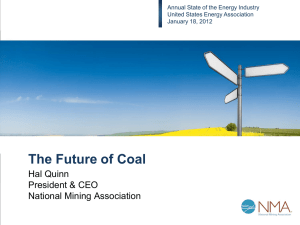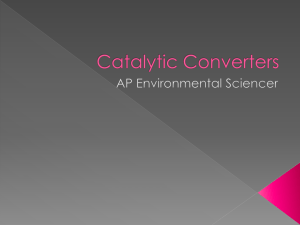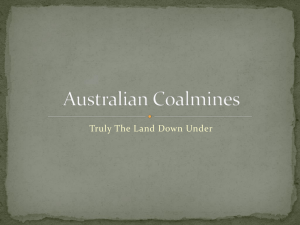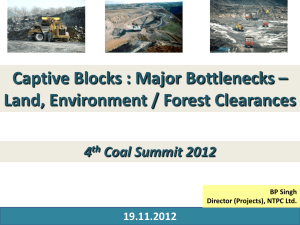Sanjeev_Aggarwal_Energy_Forum_Sept_2011
advertisement
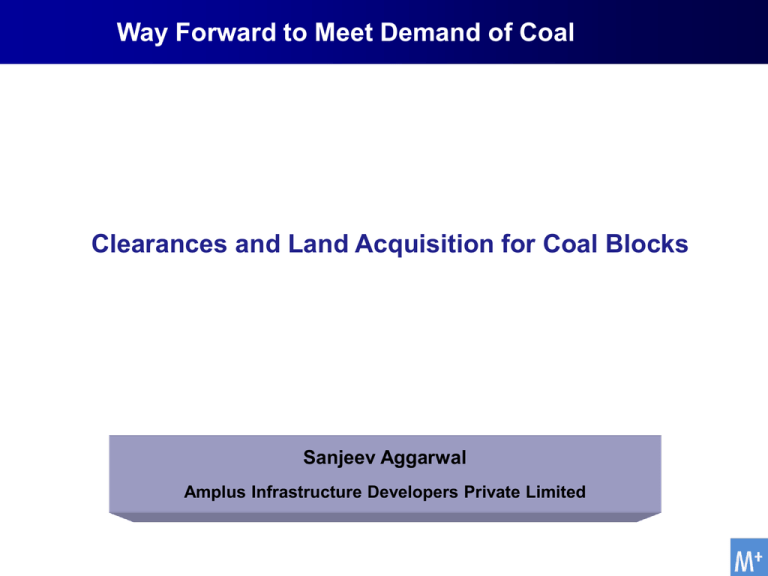
Way Forward to Meet Demand of Coal Clearances and Land Acquisition for Coal Blocks Sanjeev Aggarwal Amplus Infrastructure Developers Private Limited India’s peak power demand in 2017 is expected to be ~199GW Projected Power demand and Installed capacity requirement 300 266 249 250 233 217 202 200 186 174 174 GW 162 150 96 91 102 162 151 141 130 121 100 199 189 109 117 126 145 135 50 0 2010 2011 2012 2013 Base Demand Peak Demand 2014 2015 Installed Capacity Requirement 2016 2017 …and Installed Capacity requirement to ~266 GW by 2017 Source: CEA, 17th EPS, IEP, Planning Commission, KPMG Analysis 2 2 Of this, ~83 GW is expected to come from Thermal power plants and Coal is likely to be the dominant fuel source Capacity addition by fuel type Capacity of Coal based power plants • Maximum addition is likely to be in Thermal power plants (~83 GW) • 70 GW capacity of Coal based power plants to be added by 2017 • Coal is the dominant source of Fuel (~70 GW) 35 Coal Gas Diesel Nuclear Hydro RES Lignite 30 160 25 137 140 20 117 GW 120 100 GW 15 10 146 147 2016 2017 124 99 77 79 85 2009 2010 2011 80 60 40 5 20 0 0 2010 2011 2012 2013 2014 2015 2016 2017 2012 2013 2014 2015 Imported, 16 GW, 22% Linkage, 41 GW, 59% Captive, 13 GW, 19% • Most of the planned coal plants use domestic source (Linkage or Captive); 22% of the capacity addition is based on Imported coal GW Coal power plants by source of Coal 20 18 16 14 12 10 8 6 4 2 0 Linkage 2010 2011 Captive 2012 2013 Imported 2014 2015 2016 2017 Source: CEA, Infraline, MoP, KPMG Analysis 3 3 The significant linkage between power and coal Coal to remain as the mainstay of Indian power capacity addition Given the price difference between Indian and imported coal, huge demand for Indian coal Coal India falling majorly short of meeting the demand and pressure mounting on the coal companies to increase supply (by reducing e-auction, pit-head stocks, etc.) Why is that coal companies are unable to meet the demands of its customers? The significant linkage between power and coal Development of the coal blocks has become a challenge both for the economy as well as for the industry. Though available in plenty below the ground, is not available to meet the requirements of the growing economy leading to tremendous loss. The issues that have really pushed back the efforts are land acquisition and various clearances. And the issue is common for Coal India and the captive mining companies. Land Acquisition Even after award of the mining license, the land acquisition process remains a big challenge Revenue land (non-forest) Private land Forest land Issues range from private land prices, rehabilitation, rights of forest dwellers and so on… The government need to enforce its Eminent Domain right at least for the land that holds natural resource and complete the acquisition process in a timely manner Environment and Forest Clearance Recent issue of forest clearances: Category A / B is the biggest bugbear for most of the coal mine owners: Huge investments incurred / planned based on government allocation of coal mine. Discussion at the top levels in the GoI over last 2 ½ Years; still uncertain on what can be cleared Now, we believe that GoM has finally decided to do away with the Go/ No-Go policy Any change of policy retrospectively or uncertainty in the same is the single largest measure that impacts investments in a growth economy. Latest policy of MoEF to not grant environmental clearance till the forest clearance is obtained will further add on to the timelines 7 How can we do it better? Forest clearances: With the curtain drawing on the Go/ No-Go issue, we expect hat the forest clearance will be much more timely and systematic Avoid linking of environmental clearance with forest clearance The new land acquisition bills/ rules can provide for compulsory land acquisition for areas bearing natural resources Provide PL immediately to all pending applicants along with the permission to prospect in forest areas – prospecting need not involve any forest loss. Increasing the production for the future.. Coal Block allocation through competitive bidding is the next step: Avoid the issues of environment and forest clearance by pre-screening the blocks Increase coal production through involvement of real mining companies and avoid squatters that may hold on the resource Avoid speculation by providing as much data as possible Up-front premium just increase the speculation premium rather than bringing in real efficiencies The long expected coal regulatory system can take care of the concerns about excessive profiteering by the mining companies Result: The coal will be available in plenty, to all the needy, and at the right cost. Thank you

